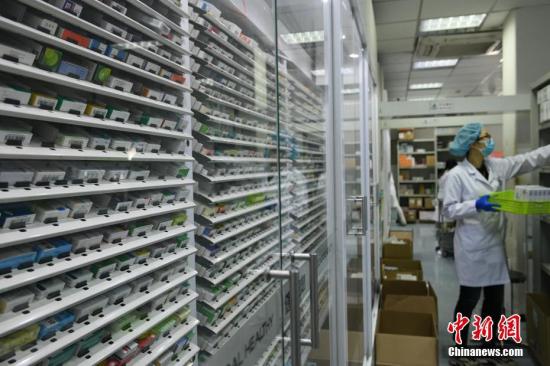(Observation of the Two Sessions) Behind the "soul bargaining", how should China encourage the research and development of innovative drugs?
China News Agency, Beijing, March 7th: Behind the "soul bargaining", how should China encourage the research and development of innovative drugs?
China News Agency reporter Zhang Ni
"Seeing a doctor and taking medicine" has always been a hot topic of public concern.
According to the "2021 Statistical Bulletin on the Development of Medical Insurance" recently released by the National Medical Insurance Bureau of China, since the establishment of the National Medical Insurance Bureau, the National Medical Insurance Bureau has conducted 4 consecutive access negotiations on the medical insurance drug catalog, and a total of 250 drugs have been added to the catalog through negotiation. With an average drop of more than 50%, the "soul bargaining" scene is often hotly debated.
In this context, will the research and development of domestic innovative drugs be affected?
How to better encourage enterprises to develop innovative drugs?
These issues have become one of the focuses of the National Two Sessions this year.
During the National Two Sessions this year, Gu Jianwen, a member of the National Committee of the Chinese People's Political Consultative Conference, submitted the "Proposal on "Improving the Ecology of Pharmaceutical Innovation to Promote the Healthy Development of the Industry".
Data map: Pharmacists prepare medicines for patients through an automatic dispensing system.
Photo by China News Agency reporter Tong Yu
He emphasized that in recent years, domestic pharmaceutical innovation is entering a period of leap from quantitative growth to qualitative improvement, and some fields have followed and started to lead.
Especially in the context of the new crown pneumonia epidemic, China's pharmaceutical innovation, especially biomedical innovation, has played an important role in epidemic prevention and control, boosting economic recovery, and effectively safeguarding people's lives and health and national biosecurity.
However, at present, there are great uncertainties in the research and development of new drugs. The huge investment in new drug research and development, the long return time, high risks, and the lack of overall innovation of pharmaceutical companies have all become "stumbling blocks" for the innovation and development of domestic pharmaceuticals.
Gu Jianwen believes that the current problems are multi-faceted: First, there is still a lack of macro and long-term policy support for improving the pharmaceutical innovation ecology; If it is included in the medical insurance catalog, it will also face greater pressure to reduce prices, which is not conducive to the return of drug research and development; third, the renegotiation of new indications for innovative drugs will have an impact on drug prices.
In this regard, he put forward a number of suggestions, including the proposal to introduce a more systematic and programmatic plan at the national level, from research and development incentives, pricing mechanism, medical insurance access, benchmark drug access, landing admission, improving the multi-level medical insurance payment system, Tax relief, local government support and other dimensions ensure that innovative drugs can benefit more patients faster, improve medical effects, upgrade the ecology of China's pharmaceutical industry, and create a better development soil for local innovative drugs.
In addition, he also suggested that the predictability of medical insurance access policies should be improved with the help of the "baton" of industry standards.
Drawing on the indicators of quality-adjusted life years and cost-benefit assessment in the value-based pricing mechanism of developed countries, as well as the specific industrial structure of generic drugs and innovative drugs in China, comprehensively considering the clinical value, payer value, innovation value and patient value of drugs, Clarify different value dimensions, categories and weights of indicators.
In the medical insurance access and price negotiation procedures, the weight of the efficacy indicators of drugs should be gradually increased.
Talking about the limited linkage between price policy and other pharmaceutical policies for innovative drugs, Fang Laiying, a member of the National Committee of the Chinese People's Political Consultative Conference, believes that in terms of negotiating the landing of drugs, the conversion mechanism of "price-for-volume" after the price reduction of some innovative drugs is not smooth.
Although the National Medical Insurance Administration clearly stipulates that the new version of the medical insurance catalogue will be implemented from January 1, 2022, the medical insurance departments in some places are limited by their ability to guarantee personnel and property, handling services, and informatization standardization support. Without timely, full and convenient reimbursement, the insured people’s sense of gain is greatly reduced.
In terms of negotiating the landing of drugs, Fang Laiying suggested that the National Medical Insurance Bureau implement the "Typical Case Promotion Project for the Landing of Medical Insurance Varieties", formulate the "Guidelines for the Construction of National Medical Insurance Drug Landing Capability", and strongly support some leading provinces and cities to explore general outpatient policies, outpatient chronic diseases/ Outpatient special disease model, special drug policy, collect, select, and praise a number of pilot demonstration areas for the implementation of medical insurance drugs, and replicate and promote to the whole country in 2022.
(over)

